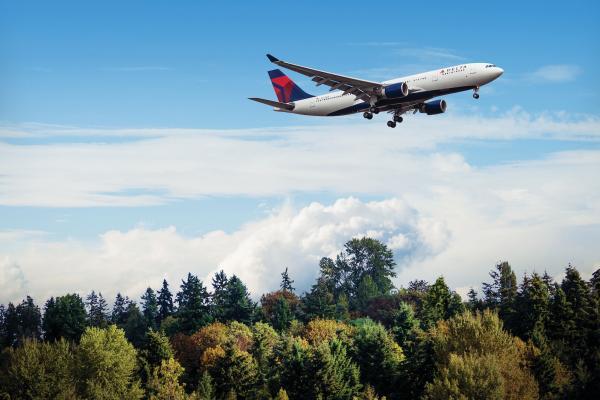
Delta Air Lines plans to spend $1 billion over the next decade to “mitigate” all emissions from its business, investing in a wide range of initiatives to reduce or eliminate carbon emissions throughout its business.
“[We] know there is no single solution. We are digging deep into the issues, examining every corner of our business, engaging experts, building coalitions, fostering partnerships and driving innovation,” Delta CEO Ed Bastian said. “We are on a journey, and though we don’t have all the answers today, we know that our scale, along with investments of time, talent and resources will bring meaningful impact to the planet and ensure the sustainability of our business for decades to come.”
Delta’s plan will not eliminate jet fuel, nor will it rely solely on offsets. It does include reducing fossil-fuel consumption through its fleet modernization—including 80 new aircraft delivered in 2019—more efficient operations, and investments in biofuels.
“We’ll be investing in technologies to reduce the impact of jet fuel, but I don’t ever see a future where we’ll eliminate jet fuel from our footprint,” Bastian told CNBC.
In January, the carrier unveiled an offtake agreement with Northwest Advanced Bio-Fuels (NWABF) that could result in deliveries of sustainable aviation fuel (SAF) by 2025 if a feasibility study now underway supports construction of a biorefinery in Washington state. The facility could supply SAF for Delta’s operations in Seattle, Portland, San Francisco and Los Angeles and provide about 10% of the airline’s annual U.S. west coast jet fuel consumption.
Delta describes the deal with NWABF as “one of the largest airline offtake agreements of its kind to purchase sustainable aviation fuel.” It follows the airline’s December 2019 agreement to buy 10 million gal. annually of renewable fuel from Gevo, beginning in 2022-23.
The Atlanta-based carrier partners with Air BP for biofuels that support carbon-neutral delivery flights.
The airline also plans to invest in “projects and technology to remove carbon emissions from the atmosphere that go beyond the airline’s current commitments,” it said. It will “explore carbon-removal opportunities through forestry, wetland restoration, grassland conservation, marine and soil capture, and other negative emissions technologies.”





